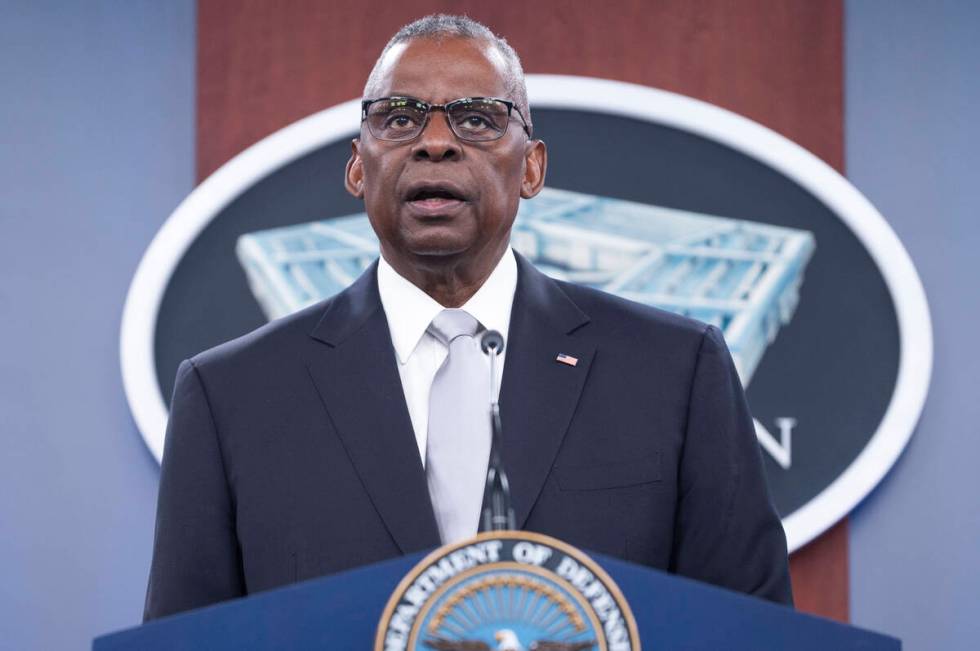U.S. hints at large response to Iran-backed militias is imminent

WASHINGTON — Defense Secretary Lloyd Austin said Thursday it’s time to further disable Iran-backed militias that have struck at U.S. forces and ships in the Middle East and the U.S. is preparing to take significant action in response to the deaths of three U.S. service members in Jordan.
Meanwhile, Austin said Thursday he never told his staff to keep his cancer surgery and hospitalization secret from the White House, but acknowledged he should have handled it differently and he apologized for keeping President Joe Biden and others in the dark for weeks.
“We did not handle this right and I did not handle this right. I should have told the president about my cancer diagnosis. I take full responsibility,” Austin told reporters in a lengthy Pentagon briefing. “I have apologized directly to President Biden and I’ve told him that I’m deeply sorry for not letting him know immediately that I received a heavy diagnosis and was getting treatment.”
For days, the U.S. has hinted strikes are imminent. While the threat of retaliation for Sunday’s deaths has driven some terrorist groups to say they were stopping hostilities, as late as Thursday Yemen’s Houthi terrorists were still attacking vessels and fired a ballistic missile at a Liberian-flagged container ship in the Red Sea.
“At this point, it’s time to take away even more capability than we’ve taken in the past,” Austin said Thursday.
Previous U.S. strikes have not deterred the attacks. Since the war between Israel and Hamas broke out after the Hamas terrorist attack in southern Israel on Oct. 7, Iranian-backed terrorist groups have struck U.S. bases in Iraq and Syria at least 166 times with rockets, missiles and one-way attack drones, drawing about a half-dozen U.S. counterstrikes on terrorist facilities in both countries.
The U.S. military also has carried out airstrikes targeting the Iran-backed Houthi terrorists in Yemen.
The U.S. has attributed the attack on Tower 22 in Jordan to the Islamic Resistance in Iraq, an umbrella group of Iran-backed militias that includes the terrorist group Kataib Hezbollah.
While Iran has denied involvement, Austin said Thursday that “how much Iran knew or didn’t know, we don’t know. But it really doesn’t matter because Iran sponsors these groups.”
Austin said “without that facilitation, these kinds of things don’t happen.”
He said the Pentagon is still looking at the forensics of the drone that struck Tower 22, a secretive base in northeastern Jordan that’s been crucial to the American presence in neighboring Syria.
“I don’t think the adversaries are of a ‘one and done’ mindset. And so they have a lot of capability. I have a lot more,” Austin said. “We’re going to do what’s necessary to protect our troops.”
Known as an intensely private man, Austin provided his most extensive comments to date on the secrecy surrounding his cancer diagnosis and struggles with complications since his surgery on Dec. 22.
“The news shook me,” Austin, 70, said about getting the initial diagnosis in early December. “It was a gut punch. And, frankly my first instinct was to keep it private.”
While he said he “never directed anyone to keep my January hospitalization from the White House,” Austin dodged questions about any repercussions on his staff or any decisions they made about disclosing it.
He said he doesn’t believe he has created “a culture of secrecy” in his office. And he said he did not tell his aides to ask first responders to avoid using lights and sirens when calling for an ambulance on Jan. 1. But, he acknowledged, “there will be security officers, there will be other staff members who may perceive that they’re doing things in my best interest.”
His lack of disclosure prompted changes in federal guidelines and triggered an internal Pentagon review and an inspector general review into his department’s notification procedures. Both reviews are ongoing, and members of Congress have called for hearings on the matter.
Pressed on why he didn’t tell the president and others about his diagnosis and surgery, Austin said, “I’m a pretty private guy. I never like burdening others with my problems. It’s just not my way.” He added that the president has a lot of things on his plate and he didn’t want to add his personal issue to that.
He said he has learned from the experience. “Taking this kind of job means losing some of the privacy that most of us expect,” he said. “The American people have a right to know if their leaders are facing health challenges that might affect their ability to perform their duties even temporarily. So a wider circle should have been notified, especially the president.”
In the Red Sea, the Houthis have fired on commercial and military ships almost 40 times since November.
In the latest attack, they fired a ballistic missile at the M/V Koi, a Liberian-flagged container ship on Thursday, U.S. Central Command said. The ship’s management could not immediately be reached for comment. The Houthis did not claim responsibility for the assault.
The attack happened west of Hodeida, a port city in Yemen long held by the terrorists, said the United Kingdom Maritime Trade Operations, a British military group overseeing Mideast waterways.
Also on Thursday, Central Command said it had destroyed two more Houthi-fired drones.
One overhead drone, fired at 5 a.m. in Yemen, was shot down in the Gulf of Aden. A few hours later, an uncrewed surface vehicle, a drone that travels through water, was “determined to be an imminent threat” and was struck in self defense in the Red Sea, Central Command said.